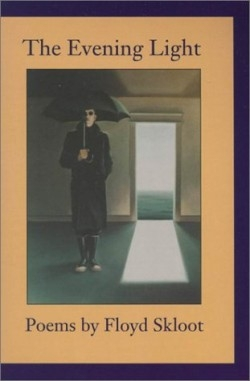The Evening Light
Skloot possesses an extraordinary talent, demonstrated in this, his third book of poetry. The title is subterfuge, luring belief in a metaphor about endings. In his skilled hand, it is less about endings than acceptance, reconciliation, and strength.
Section One “An Inner Wind,” draws inspiration from artists of the nineteenth century; Donizetti, Glinka, and Van Gogh among others. As they approach the end of life, Skloot recounts familiar stories in fresh ways. Monet is revealed by his wife, Camille. She watches him argue over art as if poverty were not an issue, though he could not pay the men who moved the family to Argenteuil. “These are men who would paint / their wives on death-beds if the light were right.” He captures Monet in a simple statement.
Skloot leaps forward with the striking poem “Oncogene” opening Section Two: “Bittersweet Nightshade.” No doubt of what is to come, he states in a matter-of-fact line
The day when he was told / he already knew. It was always there.
Death comes by train, water, and age in the next poems. “A Proper Season” asks: is there a proper season for death? Max and Rosie, fathers, brothers, and mothers are given an opportunity to speak. Careful with their stories, he counters pain with recalled joy, hurts smoothed. He speaks of struggle:
Wasn’t our home / the heart of storm, our shore given / over to the wrack of ebb and flow? / I no longer know where to turn / when loss like a gust of wind / swings me back.
Closing sections “Pure Gift” and “Daybreak” are welcome relief to the burdened reader. Skloot implores the reader to take what has been given and move ahead. Not without regrets, of course, but with the wisdom of experience. When he says “This is where the sea of my childhood ends.” he speaks of more than physical location as an older man who has buried his parents and become the adult. Continuing to grow in the final section, he fills it with seduction, food, colors, and smells, ready to live again.
After finishing, rereading the first section brings new insights, answering why he included poems so disconnected from what follows. As adept with fiction and essays as he is with poetry, Skloot writes poems as tiny novels. All five parts of this collection unite like chapters in a book that’s well worth reading.
Reviewed by
Shann Palmer
Disclosure: This article is not an endorsement, but a review. The publisher of this book provided free copies of the book to have their book reviewed by a professional reviewer. No fee was paid by the publisher for this review. Foreword Reviews only recommends books that we love. Foreword Magazine, Inc. is disclosing this in accordance with the Federal Trade Commission’s 16 CFR, Part 255.

